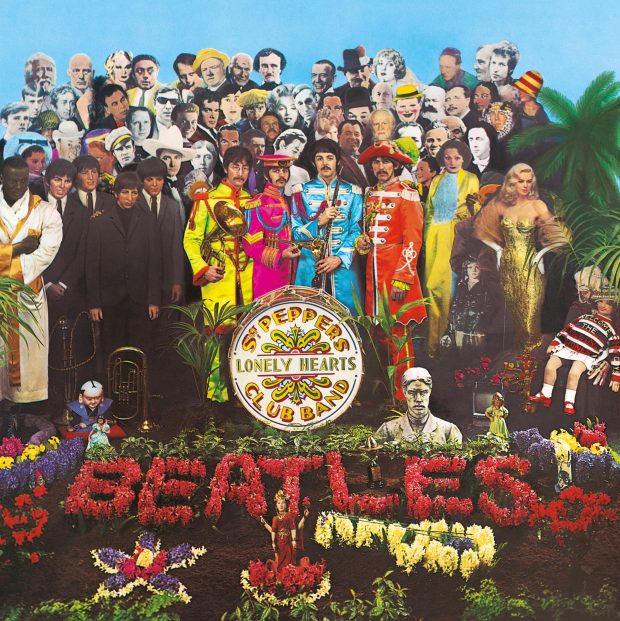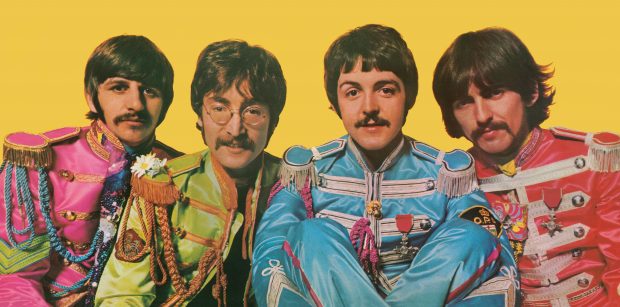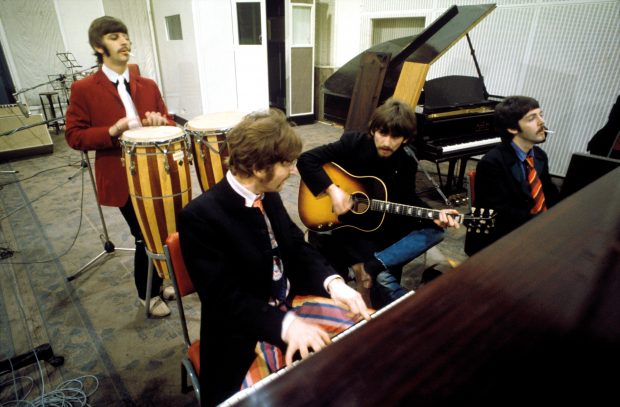© Images copyright Apple Corps Ltd.
50 years ago the creative industries were conceived in the summer of love.
Kenneth Tynan writing in The Times described it as:
A decisive moment in the history of Western Civilisation.
Langdon Winner wrote in The Rolling Stone magazine that it was:
The closest Western Civilisation has come to unity since the congress of Vienna in 1815.
They were talking about an LP containing slightly less than 40 minutes of music. June 1st, 1967 was the moment Sergeant Pepper’s Lonely Hearts Club band started to play.
Technically speaking
It had taken seven hundred hours to lay down and mix the thirteen tracks that made up the album. Producer, George Martin and sound engineers, Geoff Emerick and Richard Lush, pushed the boundaries of four-track recording into a new dimension. They changed the sound of music. With Sergeant Pepper, long playing records joined film as a truly twentieth century creative art form. Songs like ‘A Day in the Life’ sound unlike anything previously recorded. The iconic album cover: Michael Cooper’s photograph of Peter Blake and Jann Haworth’s installation, transmitted the mood of the Summer of Love from its first breath in June 1967 into the future.

The icon
The album cover as art, the audacious production techniques and the lucrative copyright portfolio would never have existed without a collaborative approach. The Beatles were a commercial boy band with a serious point to prove. Yes they packed out concert halls, yes screaming fans could drown them out and yes, they were musicians and songwriters like no others.

Genuine boy band makes fictional man band
The art
The Times’ music critic, William Mann, had already identified the genius of the Beatles:
For several decades, in fact since the decline of the music-hall, England has taken her popular songs from the United States, either directly or by mimicry. But the songs of Lennon and McCartney are distinctly indigenous in character, the most imaginative and inventive examples of a style that has been developing on Merseyside during the past few years.
Lennon’s take on a Daily Mail article about potholes in Blackburn in ‘A Day in the Life’ or his reaction to an ad for Corn Flakes in ‘Good Morning Good Morning’ were created for recorded media – not performance. With the most innovative recording set up available, The Beatles fused technical and artistic innovation. As Mann famously put it: Lennon and McCartney were ‘the greatest songwriters since Schubert’.
Creative Industry
Sergeant Pepper was an instant, global hit. It was the number one selling album throughout the summer, the autumn and the winter of love. The album set the standard for pop production for the rest of the century and it was instantly recreated. Jimi Hendrix opened his 1967 UK tour of the UK with the title track.
Of the twelve songs on the album, eight are less than three minutes long, conforming to the industry standard of the day. Only two, George Harrison’s ‘Within Without You’ and Lennon and McCartney’s ‘A Day in the Life’, are over five minutes long. Producer and head of Parlophone records, George Martin, understood the market for music. His experience producing comic songs for the likes of Bruce Forsyth and Bernard Cribbins, meant that artistic experimentation took place in market savvy conditions. Pace, musicality and inventiveness were valued. Understatement characterised the offer. Understanding liberated the creative process.

The creative process
Intellectual Property, markets and creativity
The legacy of Sergeant Pepper underpins our approach to business, intellectual property, creativity and art. The album transformed pop music from ephemera into culture. More than that, it exemplified the productive relationship between art and markets that underpins today’s creative industries. This alchemy requires a combination of technical, artistic, business and legal talents. To bring the Beatles into the room to sing about holes and Corn Flakes after seven years of touring required confidence in creatives. Sergeant Pepper was not a foolhardy venture – everybody involved in the project knew they were onto something big. However, until it was finished, no one was sure just how big.
Intellectual property lawyers know that they have many roles. Perhaps surprisingly, one of them is to be creative collaborators in the creation of art. It was another pop producer from the 1960s who explored this idea. For Andy Warhol art existed in our relationships with trade marks. The Beatles’ Sergeant Pepper was pop art personified.
To keep in touch, sign up to email updates from this blog, or follow us on Twitter.
Recent Comments